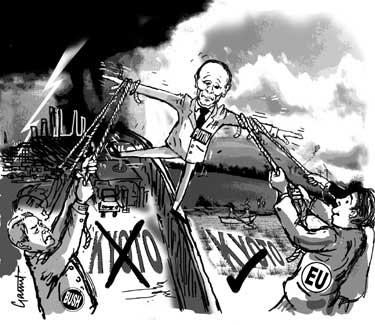
© 2004 Lawrence Moore
|
The Tenth Conference of the Parties to the climate treaty was held in Buenos Aires, Argentina, December 6-18th 2004. Newswatch editor Mick Kelly reports. |
The Tenth Conference of the Parties (COP-10) to the UN Framework Convention on Climate Change (UNFCCC) over-ran by a day as delegates sought to reach agreement on the format of future negotiations regarding what happens after the expiry of the Kyoto Protocol in 2012.
A compromise was eventually reached between the United States and Europe in the form of an agreement to hold a single meeting in May 2005 that would not open negotiations concerning further commitments. The United States had opposed European plans for a series of informal meetings. "It is a give-and-take exercise and I think on balance we are very pleased with the outcome," said Harlan Watson of the United States State Department.
During the closing session, India, with support from China, Pakistan and Saudi Arabia, called for a further agreement that developing nations would not have to accept emission cuts. But the European Union rejected the demand and the compromise agreement regarding a single meeting stood without qualification.
Throughout the meeting, developing countries argued for stronger commitments on assistance to avert the consequences of climate change.
The Africa Group emphasized the urgency of adaptation and stressed the importance of operationalizing the Special Climate Change Fund. They want funding not only for research but also for the implementation of adaptation measures.
Alberto Cárdenas Jiménez, Secretary of Environment and Natural Resources, Mexico, argued that the lack of action on adaptation limits the economic ability of developing countries to achieve sustainable development. He said that the issue has been addressed in a fragmented manner under the climate treaty and supported an Argentinian proposal for an adaptation work programme.
For the second year running, the Least Developed Countries failed to gain a commitment to full-cost funding for adaptation measures through the Least Developed Countries Fund managed by the Global Environment Facility.
The problem is that most, if not all, adaptation measures have benefits beyond coping with the impact of climate change and the Least Developed Countries Fund will not cover the proportion of the costs corresponding to these non-climate benefits. Indeed, even quantifying the proportion that could be considered related to the future impact of anthropogenic climate change poses a major scientific challenge. Moreover, with benefits in many areas, decision-making on funding becomes complex, requiring agreement across a number of sectors.
The challenge for the climate negotiators is to create sufficient institutional flexibility to ensure that adaptation issues can be dealt with effectively under the UNFCCC.
 |
|
© 2004 Lawrence Moore |
The fact that the Kyoto Protocol to the United Nations Framework Convention on Climate Change will come into force on February 16th 2005, following its ratification by the Russian Federation, led to a more positive atmosphere than at recent sessions.
Russian President Vladimir Putin signed the bill confirming approval of the Kyoto Protocol on Thursday November 4th 2004. Ratification by the Russian Federation seems to have been triggered by European Union support for Russian membership of the World Trade Organization, and visa-free travel for Russian citizens within the European Union.
With the Protocol’s entry into force:
A Pew Center initiative, aimed at bringing the United States into a post-Kyoto agreement with major emitters from the developing world, held its latest round of discussions alongside COP-10 in Buenos Aires.
"The rejection by the United States really set off the search for better ways of doing things," said Michael Zammit Cutajar, former Executive Secretary of the climate treaty secretariat, "What seems to be taking shape is a series of feasible options that respond to different economic and political circumstances." The idea is a 'variable geometry' for emissions control post-2012 that would permit approaches to vary from one country to another.
"Kyoto is a start, but ahead lies a far greater challenge: engaging all the world’s major emitters in a long-term approach that fairly and effectively mobilizes the technology and resources needed to protect the global climate," according to Pew Center President Eileen Claussen.
The approaches under consideration include methods that would link emissions targets to economic growth or focus targets on specific activities and economic sectors. National targets may represent purely financial commitments, for example, to cover the costs of emissions controls elsewhere.
Gao Feng, of the Chinese Ministry of Foreign Affairs, favours a "bottom-up approach" with each country determining for itself "what might be technically, economically, socially and politically acceptable." Bill Hare, from Greenpeace, was sceptical, saying that "bottom-up is a euphemism for not doing much at all beyond what would normally happen."
While progress was made at COP-10 on the detailed
implementation of the Kyoto Protocol, the future outlook is
clouded by uncertainty. It remains to be seen to what
extent the Kyoto emissions reductions targets for the
2008-12 period will be met. How successful will the
emissions trading schemes now underway prove to be? Can the
international community develop an equitable and effective
post-2012 settlement?
Further information
Earth Negotiations Bulletin has published a summary of the
outcome of COP-10. The Tiempo Climate Cyberlibary lists
websites related to the
UN Framework Convention on Climate Change.